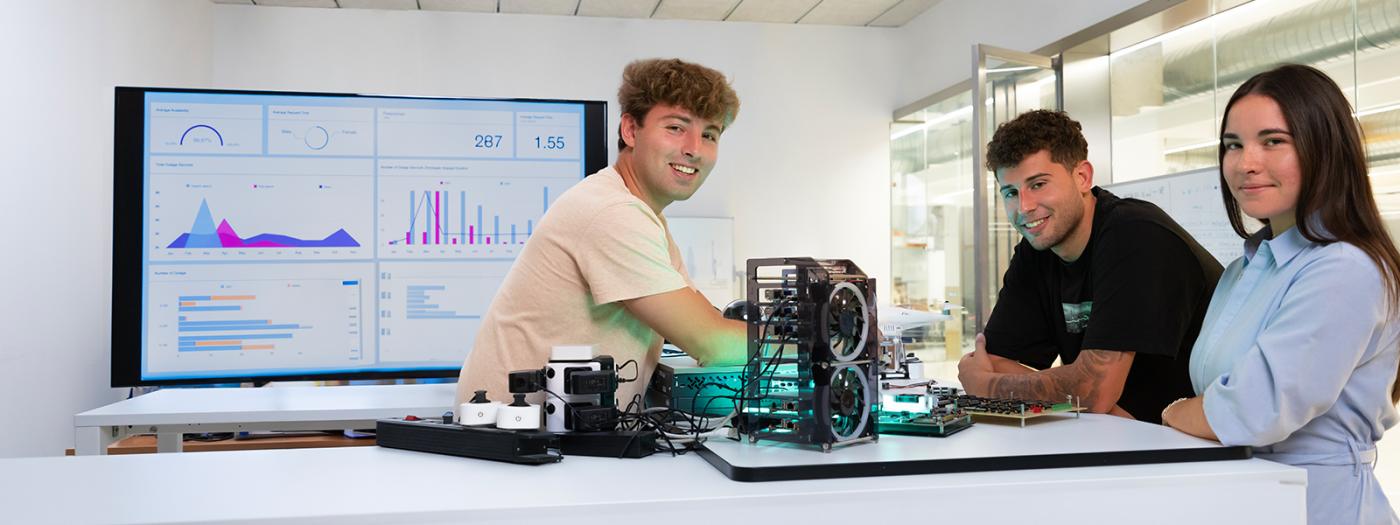Nowadays, both electronics and computers move the world. Permanently all kinds of communications (between people, between machines and between people and machines) create links that allow moving towards a faster and more interconnected future. Until relatively recently, electronics was a discipline reserved only for electronic engineers, people who had scientific capabilities that allowed them to understand the operation of sophisticated circuits.
However, electronics have evolved in such a way that it is no longer necessary to be an engineer to be able to create certain interactive platforms demanded in the market such as home automation, drone construction, mapping projections, interactive showcases ...
The figure of the technologist has appeared with the maturation of an ever-changing technological society, where the tools to be able to create software and hardware platforms are very mature and the one to know is how to use them to minimize development time, increase the experience of user and create attractive high performance applications.
The objective of the subject is that once completed, the student will be able to autonomously create different types of electronic circuits. These circuits must be connected to different types of sensors and motors that allow the student to show the acquired knowledge. In order to make the learning enjoyable, both for the realization of some exercises and the practice, the student will use the Arduino and Raspberry Pi plates.
At the end of the course the student should be able to create an interactive product that has real utility. For that reason the final practice should meet the following points:
Use sensors and actuators.
Be controlled with a mobile application.
All devices must work from their own code that the student must program.
As the practice will be carried out within a multidisciplinary group of 5 people, the results and competences will vary depending on the role the student acquires.
Titular Professors
Professors
Knowledge of Flash, OO programming and DB
RA.01 The methodology of structuring, modularization and planning of software projects aimed at the creation of interactive multimedia materials is known. (GM)
Creation of the idea
o Teams and roles
o Description of the problem
o State of the art
o Solution proposed
o Work tools
o Corporate image
o Social Media
Analysis and design of the prototype
o Technological analysis
o Structural analysis
o Functional design
o Functional analysis
o Specification of materials
o Costs
Implementation of the prototype
o Work in the realization of the prototype
Test
o initial UX Tests
o Final UX Tests
This subject bases its teaching in 3 different methodologies:
Theoretical classes [semester 1]
The theoretical classes will be carried out during the first semester where the teacher will give a series of guidelines so that the students can satisfactorily complete the proposed exercise during the rest of the week.
Classes of problems and exercises [semester 1]
The classes of problems and exercises will complement the theoretical class in which the students will have to begin to carry out the exercise that the professor proposes for the next week. The proposed exercise will be divided into tasks and roles. Although the final delivery will be made in a single document, each role will have the competence to perform a specific task.
Project Based Learning [semester 2]
During all the non-attendance hours of the second semester, the students will have to complete a single final project. This project will begin to be considered during the first semester from the classes of problems and exercises but it will be in the second semester where the students will have to plan and work together to finalize it satisfactorily.
Tutorials [semester 2]
During all the face-to-face classes of the second semester the teacher will meet 1 hour with each of the groups in order to evaluate how Project Based Learning is being carried out and thus evaluate the work performed by each of the roles.
SA1. Exercises, problems and practices [semester 1]
There will be an exercise almost every week during the first semester where each role will have a specific task. For the accomplishment of all the exercises the students have 79 hours of dedication, which is equivalent to about 6 hours per exercise.
SA2. Project [semester 2]
Based on the tutorials that will be held for 1 hour each week with each group, the teacher will be able to track the evolution of each student during the course. This way every week you can put a note in function to the work that the student has done
SA3. Self-evaluation [Annual]
Throughout the academic year there are 4 control points that will be used to evaluate the work of each team at important moments. One of the tasks that will have to be done is to evaluate each other. In this way, the teacher can have an idea about the good tuning of the team and the work load that is perceived within it.
SA4. Oral Presentations [Annuals]
In the same frequency as the previous evaluation system each group will have to present the work that has been carried out. In each one of the presentations, apart from the teachers, a specialist in the subject that is being discussed will be attending.
Note presentations = 25% note teacher + 50% specialist note + 25% note groups
